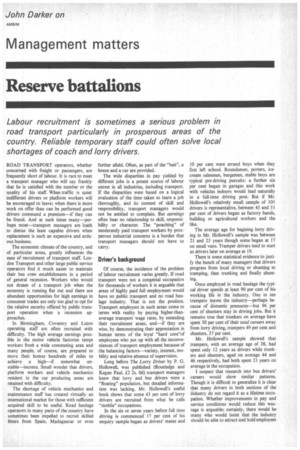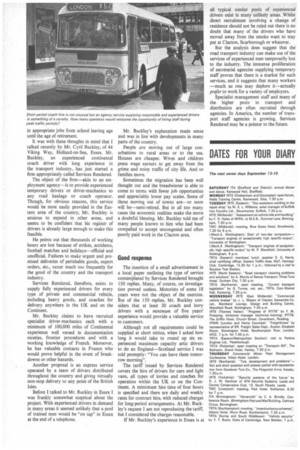John Darker on
Page 203

Page 204

If you've noticed an error in this article please click here to report it so we can fix it.
AMBIM
Management matters
Reserve battalions
Labour recruitment is sometimes a serious problem in road transport particularly in prosperous areas of the country. Reliable temporary staff could often solve local shortages of coach and lorry drivers.
ROAD TRANSPORT operators, whether concerned with freight or passengers, are frequently short of labour. It is rare to meet a transport manager who will say frankly that he is satisfied with the number or the quality of his staff. When traffic is quiet indifferent drivers or platform workers will be encouraged to leave; when there is more work on offer than can be performed good drivers command a premium—if they can be found. And at such times many—perhaps most—transport managers are loath to dimiss the least capable drivers when replacement is such an expensive and arduous business.
The economic climate of the country, and of particular areas, greatly influences the ease of recruitment of transport staff. London Transport and other large public service operators find it much easier to maintain their bus crew establishments in a period of general recession. Workers who would not dream of a transport job when the economy is running flat out and there are abundant opportunities for high earnings in consumer trades are only too glad to opt for the relative security offered by public transport operation when a recession approaches.
In Birmingham, Coventry and Luton operating staff are often recruited with difficulty. The high average earnings possible in the motor vehicle factories tempt workers front a wide commuting area and many people, of course, are prepared to move their homes hundreds of miles to achieve a high—if somewhat unstable—income. Small wonder that drivers, platform workers and vehicle mechanics resident in the car producing areas are retained with difficulty.
The shortage of vehicle mechanics and maintenance staff has created virtually an international market for those with sufficient acquired skill to be useful. Road haulage operators in many parts of the country have sometimes been impelled to recruit skilled fitters from Spain, Madagascar or even further afield. Often, as part of the "bait", a house and a car are provided.
The wide disparities in pay yielded by different jobs is a potent source of labour unrest in all industries, including transport. If the disparities were based on a logical evaluation of the time taken to learn a job thoroughly, and its content of skill and responsibility, transport managers would not be entitled to complain. But earnings often bear no relationship to skill, responsibility or character. The "poaching" of moderately paid transport workers by prosperous industrial concerns is a burden that transport managers should not have to carry.
Driver's background
Of course, the incidence of the problem of labour recruitment varies greatly. If road transport were not a congenial occupation for thousands of workers it is arguable that areas of highly paid full employment would have no public transport and no road haulage industry. That is not the position. Transport employers in such areas come to terms with reality by paying higher-thanaverage transport wage rates, by extending their recruitment areas, and—if they are wise, by demonstrating their appreciation in human terms of the loyal "hard core"of employees who put, up with all the inconveniences of transport employment because of the balancing factors—variety, interest, mobility and relative absence of supervision.
Long before The Lorry Driver by P. G. Hollowell, was published (Routledge and Kegan Paul, £2 2s. Od) transport managers knew that lorry and bus drivers were a "floating" population, but detailed information was lacking. Mr. Hollowell's useful book shows that some 43 per cent of lorry drivers are recruited from what he calls "mobile" occupations.
In the six or seven years before full time driving is commenced 17 per cent of his enquiry sample began as drivers' mates and 10 per cent were errand boys when they first left school. Roundsmen, porters, icecream salesmen, bargemen, stable boys are typical pre-driving pursuits: a further six per cent began in garages and this work with vehicles indoors would lead naturally to a full-time driving post. But if Mr. Hollowell's relatively small sample of 101 drivers is representative, between 45 and 51 per cent of drivers began as factory hands, building or agricultural workers and the like.
The average age for begining lorry driving in Mr. Hollowell's sample was between 21 and 23 years though some began at 17 on small vans. Tramper drivers tend to start as drivers later on average at 19.
There is some statistical evidence to justify the hunch of many managers that drivers progress from local driving or shunting to tramping, then trunking and finally shunting.
Once employed in road haulage the typical driver spends at least 90 per cent of his working life in the industry. One in ten trampers leaves the industry—perhaps because of domestic pressures—but 96 per cent of shunters stay in driving jobs. But it remains true that trunkers on average have spent 30 per cent of their total careers away from lorry driving, trampers 49 per cent and shunters, 37 per cent.
Mr. Hollowell's sample showed that trampers, with an average age of 38, had spent only 12 years as drivers while trunkera andshunters, aged on average 44 and 46 respectively, had both spent 21 years on average in the occupation.
1 suspect that research into bus drivers' careers would show similar patterns. Though it is difficult to generalize it is clear that many drivers in both sections of the ifidustry do not regard it as a lifetime occupation. Whether improvements in pay and service conditions would reduce this wastage is arguable; certainly, there would be many who would insist that the industry should be able to attract and hold employees in appropriate jobs from school leaving age until the age of retirement.
It was with these thoughts in mind that I talked recently by Mr. Cyril Buckley, of 44 Viking Way, Holland-on-Sea, Essex. Mr. Buckley, an experienced continental coach driver with long experience in the transport industry, has just started a firm appropriately called Services Rendered.
The object of the firm—akin to an employment agency—is to provide experienced temporary drivers or driver-mechanics to any road haulage or coach operator. Though, for obvious reasons, this service would be most easily provided in the Eastern area of the country, Mr. Buckley is anxious to expand in other areas, and seems to be confident that his register of drivers is already large enough to make this feasible.
He points out that thousands of working hours are lost because of strikes, accidents, football matches and holidays—official and unofficial. Failures to make urgent and promised deliveries of perishable goods, export orders, etc., occur much too frequently for the good of the country and the transport industry.
Services Rendered, therefore, exists to supply fully experienced drivers for every type of private and commercial vehicle, including heavy goods, and coaches for delivery anywhere in the UK and on the Continent.
Mr. Buckley claims to have recruited specialist driver-mechanics each with a minimum of 100,000 miles of Continental experience well versed in documentation niceties, frontier procedures and with a working knowledge of French. Moreover, he has valuable contacts in France who would prove helpful in the event of breakdowns or other hazards.
Another proposal is an express service operated by a team of drivers distributed throughout the country and giving virtually non-stop delivery to any point of the British Isles.
Before I talked to Mr. Buckley in Essex I was frankly somewhat sceptical about the project. With experienced drivers in demand in many areas it seemed unlikely that a pool of trained men would be "on tap" in Essex at the end of a telephone. Mr. Buckley's explanation made sense and was in line with developments in many parts of the country.
People are moving out of large conurbations to rural areas or to the sea. Houses are cheaper. Wives and children press wage earners to get away from the grime and noisy traffic of city life. And so families move.
Sometimes the migration has been well thought out and the breadwinner is able to come to terms with fewer job opportunties and appreciably lower pay scales. Some of those moving out of towns are—or soon will be—semi-retired. But in all too many cases the economic realities make the move a doubtful blessing. Mr. Buckley told me of many people known to him who had been compelled to accept uncongenial and often poorly paid work in the Clacton area.
Good response The insertion of a small advertisement in a local paper outlining the type of service conteniPlated by Services Rendered brought 150 replies. Many, of course, on investigation proved useless. Motorists of some 18 years were not the object of the exercise. But of the 150 replies, Mr. Buckley considers that at least 20 coach and lorry drivers with a minimum of five years' experience would provide a valuable service to customers.
Although not all requirements could be supplied at short nbtice, when I asked how long it would take to round up six experienced maximum capacity artic drivers to do an England—Scotland service I was told promptly: "You can have them tomorrow morning".
The tariff issued by Services Rendered covers the hire of drivers for cars and tight vans, all types of lorries and coaches for operation within the UK or on the Continent. A mirnimum hire time of four hours is specified and there are daily and weekly rates for contract hire, with reduced charges for long-period arrangements. At Mr. Buckley's request I am not reproducing the tariff, but I considered the charges reasonable.
If Mr. Buckley's experience in Essex is at all typical similar pools of experienced drivers exist in many unlikely areas. Whilst direct recruitment involving a change of residence should not be ruled out there is no doubt that many of the drivers who have moved away from the smoke want to stay put at Clacton, Scarborough or whatever.
But the analysis does suggest that the road transport industry can make use of the services of experienced men temporarily lost to the industry. The immense proliferation of secretarial agencies supplying temporary staff proves that there is a market for such services, and it suggests that many workers —much as one may deplore it—actually prefer to work for a variety of employers.
Specialist management staff and many of• the higher posts in transport and distribution are often recruited through agencies. In America, the number of transport staff agencies is growing. Services Rendered may be a pointer to the future.




































































































































































































































































